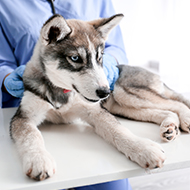
Veterinary professionals will be asked to share their views on the proposed reforms.
Veterinary professionals will be asked for their views on the provision of "under care" and 24-hour emergency cover as part of a new consultation approved by RCVS Council.
Proposals in the draft guidance – including a change to the current guidance on 'under care' - will be included in the professional consultation, which could start as early as next week.
Eleanor Ferguson, RCVS registrar, told a virtual council meeting on Wednesday (6 June), that the professional consultation would be carried out over the summer, with a final decision on the proposals made by the end of the year.
Under current regulation, a veterinary surgeon can only provide prescription-only medicines after carrying out a clinical assessment and the animal must be 'under their care'. However, the terms 'under care' and 'clinical assessment' are not defined by legislation, so it is left to the RCVS to interpret what they mean.
The new proposals suggest that an animal is under a veterinary surgeon’s care when they accept responsibility for an animal's health 'whether generally, or by undertaking a specific procedure or test'. Responsibility for an animal may be given by the owner, statute or other authority'.
On 24-hour emergency cover, the draft paper does not propose any substantial changes. However, it does propose that the current guidance on limited service providers be removed and replaced with a general obligation 'to provide 24-hour emergency cover that is proportionate to the service they offer'.
Outgoing RCVS president Dr Kate Richards said that the temporary guidance introduced during the COVID-19 pandemic had offered the college a unique opportunity to carry out vital research.
Council members were generally supportive of the new proposals, however some voiced concerns about the wording and the consequences of the proposals in the fight against antimicrobial resistance (AMR).
Council member Jo Dyer refused to back the draft, saying that the change is not in line with the college's mission statement to set, uphold and advance veterinary standards. “I don't think it's the action of a responsible regulator, and I don't think it's the right thing for animal welfare,” she said.
Council member Sue Paterson told the meeting that while she supported the proposals, the measures concerning antimicrobial resistance (AMR) required more “teeth”. “I think we have a huge responsibility to be very competent in the fact that antimicrobial resistance is a massive problem, she said. “I'd like to see the guidance strengthened somewhat."
Newly appointed council member Will Wilkinson also expressed concern about the wording of the draft proposals, and stressed that if the College does not propose any substantial changes, then it is “essentially ruling out listening to the profession”. He later added: "There is a real risk that improper practices will develop over time with the current wording".
During the meeting, council members voted for a separate consultation with the public on under care and 24-hour cover. The College said that negotiations are already underway with YouGov about how this may be organised.
The draft consultation Annexe A - available to read on the RCVS website - was approved by 16 votes to two.



 The Federation of Independent Veterinary Practices (FIVP) has announced a third season of its podcast, Practice Matters.
The Federation of Independent Veterinary Practices (FIVP) has announced a third season of its podcast, Practice Matters.